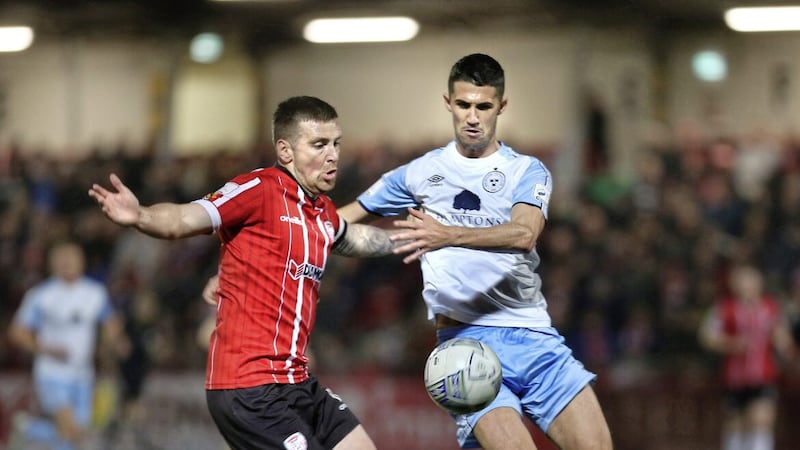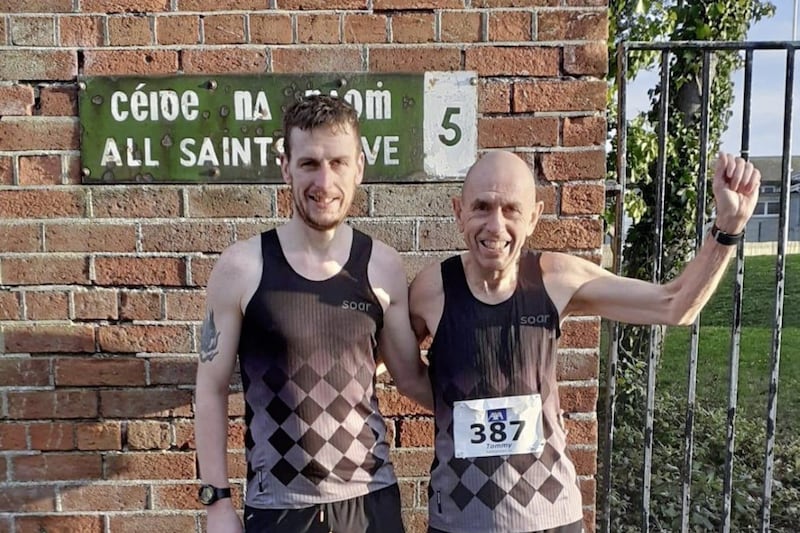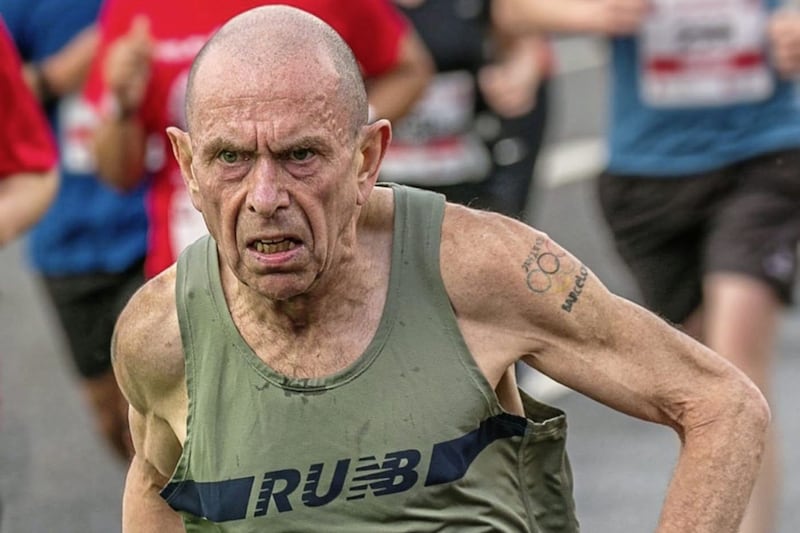WITH one final glance at his watch Tommy Hughes’s familiar hunched gait slows to a stop. The crowds packed behind railings on either side of the Mall are in fine voice as they cheer the last strides of those participating in this year’s London marathon.
As the finish line nears, some shout his name. People he doesn’t know and has never met, yet they know him.
“Go on Tommy, you’re nearly there”
“You’re doing brilliant Tommy, keep going”
Their words of support barely register, though not because of tiredness in the legs or focus on finishing the job at hand. Instead, the 61-year-old’s mind is already drifting miles back, to the call of nature that cost him what he came for.
“I had to pit-stop halfway round - jump the ditch as they say.
“I never had that before. You couldn’t get to the toilets at the start because there was that many people there. And then you were fighting your way through slower runners for probably the first mile, trying to make up time.
“Eventually I saw this pile of trees and started climbing over the fence, but I couldn’t get over. This boy saw me struggling and lifted it up so I could get through...”
He stopped his watch then restarted once back among the throng. When the course was completed it read 2:29:33, but the official clock said 2:30:46.
There wasn’t another man over 60 within 20 minutes of his time. To most normal people, regardless of age, the idea of clearing 26.2 miles in a fraction over two-and-a-half hours is unthinkable.
But Tommy Hughes is not normal.
Having run sub-2:30 marathons in each of the past four decades, he is determined to stretch that into a fifth. Weeks on from London, it still gnaws that this target has thus far proved elusive.
To add to his frustration, the parent and child world marathon record – which Tommy and youngest son Eoin smashed in Frankfurt two years ago – was there for the taking too.
The pursuit of such minor margins remains both a blessing and a curse, the carrot at the end of the stick leaving him hungry for more and making it that bit easier to heed the alarm for 5am runs through the winter months. Day by day, it helps keep his demons in check too.
Because for all the preternatural ability to absorb and embrace the road’s grind, the physiological gifts that helped him to multiple marathon victories and a place at the 1992 Olympic Games, the most remarkable aspect of Tommy Hughes’s story is that he is still here to tell it.
A battle with alcoholism has lurked in the shadows of his success at different stages, to the point that when he wasn’t training flat out, he was drinking flat out. There was no middle ground.
Until his last drink in 2018, that was the pattern of life across decades as the most incompatible of addictions took turns at the wheel - one steering him towards clarity and contentment, the other down a path that cleared all before it.
“It’s like a self-destruct button,” he says with a rueful smile, “I don’t know why. I don’t seem to know any other way… it’s just my nature.
“All or nothing.”
****************
IT was by complete accident that Tommy Hughes discovered he was born with something special. Like most young men growing up in south Derry then, the only time you ran any kind of distance was to get fit for when football started.
The Gulladuff man was put off though when, having been involved throughout Lavey’s run to the 1975 Derry minor championship final, he didn’t feature in the decider against Kilrea.
Married life brought him up the road to Maghera at 21, where his football career was resurrected with Watty Graham’s – but not for long.
“I was piling on the weight so I joined Glen. Nobody was telling me when training was, so I joined the committee just to find out.
“I was on the reserves but, being competitive, I wanted to get on the senior team, so I started going running to try and get that extra bit of weight off, get myself into decent shape.
“I soon realised I was much better at the running than the Gaelic…”
With long legs, despite his 5’8 frame, a low knee lift and a cardiovascular system the equivalent of a Honda engine, it soon became clear that Hughes was built to last.
His first crack at the Belfast marathon, in 1983, saw him cross the line in just over three hours having struggled after the 20 mile point. Five years later he was first past the post in 2:19:00.
For all the carnival atmosphere and Bank Holiday bonhomie that surrounds the showpiece events, it was the daily slog which really drew him in. Once he could see improvement, he learned to love the hard yards and the isolation of the roads around the Sperrins.
The routine, the discipline, the focus, it was all or nothing - and he was all in.
Yet Tommy Hughes’s head was never filled with dreams of glory on a global scale.
He watched in awe when John Treacy finished second in the men’s marathon at the 1984 Olympics in Los Angeles, never for a second imagining he could grace such a stage.
By the time the Barcelona Games came around eight years later, however, the pair were team-mates - a time of 2:13:59 at the Marrakesh marathon enough to seal Hughes’s spot on the Irish team.
Unfortunately, though, injury struck at precisely the wrong time.
“After Marrakesh in January that year, I was in the best shape of my life. That time was my PB and still is... I never got near it again.
“But then in February I got a stress fracture in my foot, to the point I couldn’t even put it on the ground. The doctor said I had no chance of being ready for the Olympics in August. The way I saw it, I had to be ready.
“I got a turbo-trainer on the bike, then I went with the Irish team to a warm weather training camp in Italy - Catherina McKiernan was training on the grass all the time so I stuck with her. It was on the bus to the airport it was confirmed I had been selected for Barcelona… I’ll never forget that moment.
“I took the family to New Jersey that summer because I knew it was really hot and I’d be able to acclimatise there. And I recovered in time, just about.”
Yet as the sun beat down on the start line, Hughes knew the mission to Marrakesh would not be repeated. This time something else was driving him on.
The men’s marathon was the last event in Barcelona and, because of the closing ceremony taking place that Sunday night, anyone with a finishing time longer than 2:45 was redirected to a finishing point outside of Estadi Olympic.
“There was no way I was going to let that happen,” he smiles, “that was my motivation.
“Coming into the stadium, seeing yourself up on the screen with the Irish kit on, it was unbelievable.
“I gave it my best shot, I ran it in 2.32 or something [2:32:55], ended up finishing 72nd. If I’d been in my best shape, who knows… but, having been told I wouldn’t even be there, how could I be disappointed?”
Treacy was 35 in Barcelona, Hughes would have been 36 by the time Atlanta came around in 1996. By then, though, running had been parked. Put away. Been there, done that.
An electrician by trade, earning a living was now the priority. And while he returned to win the 1998 Belfast marathon - 10 years on from his maiden victory - it was only ever stop-start, the drive to sustain that competitive edge no longer there.
“I thought that was it – that’ll do me. I got further than I ever thought I’d get, then I left the running altogether.
“When I was working away in England I was eating kebabs, smoking, drinking beer… I’ve been out for five or six years at times, periods where I wouldn’t be interested in running, wouldn’t look near results or anything like that.
“I always found a way back eventually, but I thought I could do without it.”
How wrong he was.
****************

LIKE running, the drinking came and went too. Episodes of binging would be followed by periods of depression, often leading Tommy back – albeit temporarily – to the road.
Belfast reeled him in again at the age of 48, a sixth-place finish in 2.28.38 remarkable by anybody’s standards. By the time he hit his early 50s, though, it no longer felt as easy.
Feeling out-of-sorts, the father-of-four slipped into a funk, increased alcohol intake serving only to accentuate the worst of everything.
“I would have gone for periods not drinking at all, but those times when I was were getting more frequent. Every two or three months I’d go on a binge for two weeks, drinking bottles of vodka every day.
“It was just wrecking everybody’s lives, but I didn’t realise that. Whenever it gets a hold of you, you don’t see anything that’s going on around you. You’re just thinking of the next drink. You’re aware of that but you can’t do anything about it.
“One time I was on a real binge and I remember watching these videos on YouTube about stopping drinking, to find out how to do it. There was an interview with a woman, Elizabeth Vargas, an anchor for ABC in America, She’s an alcoholic too.
“Her video was so powerful to me – it hit me really hard. She said in it that, at the time, alcohol came before her two weans… I could understand what she was saying. She loves her children, same way I love my children, but that’s where it takes you.
“My family all knew I had this problem, they could see it happening, but what can they do? I moved out of this house [in Gulladuff] and into a house in Maghera on my own. I was drinking for three months, my family, my brothers, they all rallied round to try and get me to stop.
“My brother’s wife took me down to a counsellor in Ballymena, but if you’re not ready to do it, it doesn’t matter how many counsellors you talk to. She couldn’t figure out why I was drinking again, stopping, then drinking again.
“I told her when I’m ready again, I will stop it – but that could go on for years and years, and maybe when I’m ready is when I’m dead.”
In a welcome twist of fate, however, his addiction would ultimately help solve the riddle of why he had felt such a dramatic change in the first place.
Following one particularly bad episode – “three months of drinking vodka every day” - his partner Anne took him to the health centre in Maghera.
A subsequent blood test turned up extremely high levels of calcium in Hughes’s bloodstream, caused by hyperparathyroidism, and all linking back to a malfunctioning gland in his neck, no bigger than a grain of rice.
“If that condition hadn’t been detected, I’d have had brittle bones as I got older, which would probably have stopped the running altogether. I had no clue before, none at all. I thought it was just my age.
“But when that blood sample came back they realised ‘hold on a minute, there’s something else wrong here’. It turned out to be a blessing in disguise.
“After that, everything sort of made sense, what was wrong with me – the tiredness, the bad form. And I realised, this alcohol thing, I have to get a hold of it.”
Upon its discovery, Hughes was given a choice: take medication to control it for the rest of his life, or have the gland removed. The competitor in him soon shot to the surface.
After going under the knife towards the end of summer 2018, Hughes was told not to run for at least three weeks. He barely lasted one.
“I was straight back at it, this big patch on my neck.
“I was spotted running past the clinic in Maghera, then next time I was in they were telling me off.”
By September he was back racing, helping Ireland to team bronze in the half-marathon at the World Masters Championships in Malaga. It was just 14 months later that Tommy and Eoin smashed the parent and child world record in a joint time of 4:59:22.
“That’s the thing I’m most proud of,” he says, standing up to take down a framed picture of the pair from the wall, “more than anything else. More than the Olympics even.”
It meant more too because of the personal journey travelled in such a short space of time. From lost soul to last chance saloon, he knows he can’t ever afford to slip up again.
“I’m learning to control it.
“It’s been three years now, it’s getting easier not to think about it any more… I still think about it a bit. It was always a stress release for me, so whenever you don’t have it, you’re always looking for something else.
“But I feel like I’m a different person now. Before, I wasn’t interested in anything where now I’ve got my normal life back. My children, I was useless to them… now they’re not afraid to ring me up. They know I’m okay.”
And if he doesn’t answer, they have a fair idea where he’ll be.
The load has lightened over time but twice daily runs remain the norm, occasional reduced pace rather than rest days. Tomorrow he’ll probably do 20 miles, maybe more.
For while London stuck in the craw, sights were swiftly readjusted. The Valencia marathon takes place on December 5, a hotel 300 yards from the start line strategically chosen to avoid any similar issues arising.
And when Tommy takes care of this target, which he will, he’ll move onto the next one. That’s always been the way, and will be for as long as his body continues to answer the call.
“In the back of my mind I’m always training to race, and I’ll keep doing that. As the years go by I’ll get slower but, for my age, I’m surprising myself.
“Honestly, I’d go far as to say running saved my life. Easily… easily. I’d be dead if I hadn’t the running.
“That’s why I have to keep going.”






